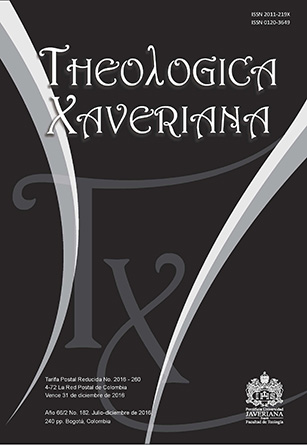Abstract
The present article aims to stress on the theological language used by mystics to communicate their experience of God. Mystics agree on the need to use analogies in order to speak about Godeven if words are not able to express what they really have experienced. Most of them describe visions in which God reveals himself to offer them knowledge and clarity about how they should conduct their lives and move others toward conversión; they also elaborate a kinotic theology as the best way to follow Jesus; that is, assuming obedience as annihilation or detachment of the human will in order to give way to the divine will.
Anónimo inglés (siglo XIV). La nube del no saber y el libro de la orientación particular (5a. ed.). Madrid: Paulinas, 1998.
Areopagita, Pseudo Dionisio. La jerarquía celestial, la jerarquía eclesiástica, la teología mística. Traducción de Pablo A. Cavallero. Buenos Aires: Losada, 2007.
_____. Obras completas. Madrid: Biblioteca de Autores Cristianos, 1995.
Bara Bancel, Silvia. “Las raíces de la felicidad, según el Maestro Eckhart”. En Mística y filosofía, editado por F. Javier Sancho Fermín, 131-144. Ávila: CITes, 2008.
Barrett, Cryl. Ética y creencia religiosa en Wittgenstein. Madrid: Alianza, 1994.
De Amberes, Hadewijch. Flores de Flandes. Traducción del neerlandés medio-bajo por Carmen Ros y Loet Swart. Madrid: Biblioteca de Autores Cristianos, 2001.
_____. Visiones. Traducción de María Tabuyo Ortega. Barcelona: Medievalla, 2005.
Beneito, Pablo; Lorenzo Piera y Juan José Barcenilla. Mujeres de luz. La mística femenina y lo femenino en la mística. Madrid: Trotta, 2001.
Concilio Vaticano II. Gaudium et spes. Madrid: Biblioteca de Autores Cristianos, 1976.
De Binguen, Hildegarda. Scivias. Conoce los caminos. Traducción de Antonio Castro Safra y Mónica Castro. Madrid, Trotta, 1999.
De Certeau, Michel. La debilidad de creer. Buenos Aires: Katz, 2006.
_____. La fábula mística. Epilogo de Carló Ossola. Madrid: Siruela, 2006.
De Paz Blanco, María Rosario. “Lenguaje y experiencia en la mística judía”. Tesis de Doctorado en Filosofía y Derecho, Universidad Complutense de Madrid, 2008.
Deseille, Placide y Enzo Bianchi. Pacomio, e la vita comunitaria. Comunità di Bose: Qiqajon, 1998.
Faggin, Giuseppe. Meister Eckhart y la mística alemana medieval. Traducción de Elena Sella. Buenos Aires: Sudamérica, 1953.
Flórez, Alfonso. La ética de Meister Eckhart. Bogotá: Pontificia Universidad Javeriana, 1983.
González, Edith. “Mística medieval femenina. El lenguaje teológico de ayer y de hoy”. Tesis doctoral en Teología, Pontificia Universidad Javeriana, Bogotá, 2015.
Hass, Alois M. Visión en azul. Estudios de mística europea. Traducción de Victoria Cirlot y Amador Vega. Madrid: Ediciones Siruela, 1999.
Ladrière, Jean. La articulación de sentido. Salamanca: Sígueme, 2011.
Macquarrie, John. God-talk, el análisis del lenguaje y la lógica de la teología. Salamanca: Sígueme, 1976.
Maestro Eckhart. Obras alemanas. Tratados y sermones. Traducido por Ilse M. de Brugger. Barcelona: Edhasa, 1983.
Mañon, Guillermo. “La mística del Maestro Eckhart”. Biblioteca ITAM, http:// biblioteca.itam.mx/estudios/60-89/74/GuillermoManonLamisticadelmaestro.pdf (consultado el 19 de enero de 2015).
Martín Velasco, Juan de Dios. “La experiencia de Dios hoy”. Maresa 75 (2003): 37-66.
Norwich, Juliana. Libro de visiones y revelaciones. Edición y traducción de María Tabuyo. Madrid: Trotta, 2002.
Porete, Margarita. El espejo de las almas simples. Edición y traducción de Blanca Gari. Madrid: Siruela, 2005.
Ruiz Bueno, Daniel (traducción e introducción). El pastor de Hermas. Madrid: Aspas, 1947.
San Agustín. De doctrina christiana. Traducido por R. P. H. Green. New York: Oxford University Press, 1995.
San Bernardo (Abad de Claraval). Sobre el cántico de los cánticos de Salomón. Traducido al español por el P. Mro. Fr. Adriano de Huerta. Valladolid: Tomás Cermeño, MDCCC.
Santa Ángela de Foligno. Experiencia de Dios amor. Traducción, introducción y notas de fray Contardo Miglioranza. Madrid: Apostolado mariano. s/f.
Santa Teresa de Jesús. El libro de la vida. Madrid: Algaba, 2007.
_____. Obras. Tomo I. Madrid: Mercurio, 1752
Schillebeeckx, Edward. En torno al problema de Jesús. Claves de una cristología. Madrid: Cristiandad, 1983.
Searle, John. Actos de habla. Madrid: Cátedra. 2004.
Tabuyo, María y Agustín López (traductores). Cábala. Nuevas perspectivas Madrid: Siruela, 2005.
Vide, Vicente. Los lenguajes de Dios. Pragmática, lingüística y teología. Bilbao: Universidad Deusto, 1999.
Wittgenstein, Ludwig. Tractatus Logico-Philosophicus. Madrid: Tecnos, 2013.
This journal is registered under a Creative Commons Attribution 4.0 International Public License. Thus, this work may be reproduced, distributed, and publicly shared in digital format, as long as the names of the authors and Pontificia Universidad Javeriana are acknowledged. Others are allowed to quote, adapt, transform, auto-archive, republish, and create based on this material, for any purpose (even commercial ones), provided the authorship is duly acknowledged, a link to the original work is provided, and it is specified if changes have been made. Pontificia Universidad Javeriana does not hold the rights of published works and the authors are solely responsible for the contents of their works; they keep the moral, intellectual, privacy, and publicity rights.
Approving the intervention of the work (review, copy-editing, translation, layout) and the following outreach, are granted through an use license and not through an assignment of rights. This means the journal and Pontificia Universidad Javeriana cannot be held responsible for any ethical malpractice by the authors. As a consequence of the protection granted by the use license, the journal is not required to publish recantations or modify information already published, unless the errata stems from the editorial management process. Publishing contents in this journal does not generate royalties for contributors.



